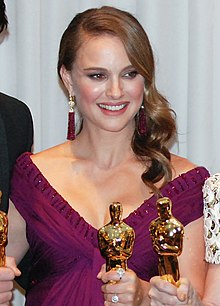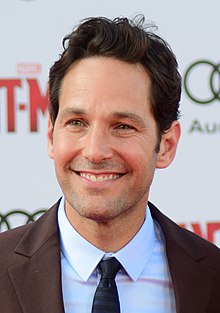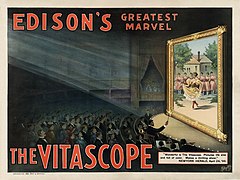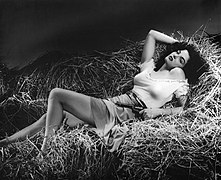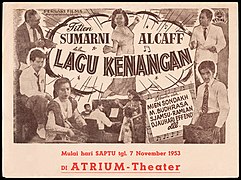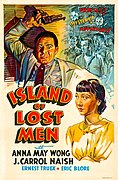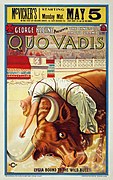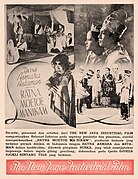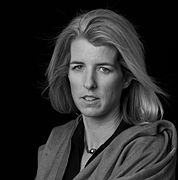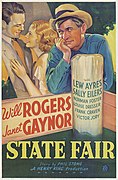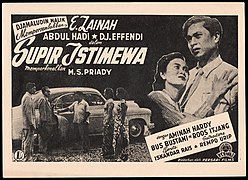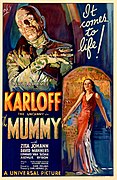Portal:Film
The Film Portal
 A film (British English) – also called a movie (American English), motion picture, moving picture, picture, photoplay or (slang) flick – is a work of visual art that simulates experiences and otherwise communicates ideas, stories, perceptions, feelings, beauty, or atmosphere through the use of moving images. These images are generally accompanied by sound and, more rarely, other sensory stimulations. The word "cinema", short for cinematography, is often used to refer to filmmaking and the film industry, and the art form that is the result of it. (Full article...)
A film (British English) – also called a movie (American English), motion picture, moving picture, picture, photoplay or (slang) flick – is a work of visual art that simulates experiences and otherwise communicates ideas, stories, perceptions, feelings, beauty, or atmosphere through the use of moving images. These images are generally accompanied by sound and, more rarely, other sensory stimulations. The word "cinema", short for cinematography, is often used to refer to filmmaking and the film industry, and the art form that is the result of it. (Full article...)
Featured articles -

Star Trek is an American science fiction media franchise that started with a television series (simply called Star Trek but now referred to as Star Trek: The Original Series) created by Gene Roddenberry. The series was first broadcast from 1966 to 1969. Since then, the Star Trek canon has expanded to include many other series, a film franchise, and other media.
The film franchise is produced by Paramount Pictures and began with Star Trek: The Motion Picture in 1979. That film and the five that followed all starred the cast of The Original Series. The seventh film, Star Trek Generations (1994), was designed to serve as a transition from the original cast to that of the next series, Star Trek: The Next Generation. The next three films just starred the cast of The Next Generation, and ended with Star Trek: Nemesis (2002), which disappointed at the box office. (Portal:Film/Featured content)
General images -
Selected image
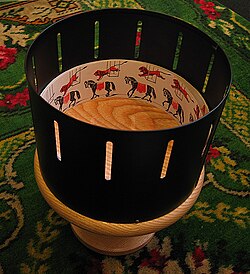
A modern replica of a Victorian zoetrope. A zoetrope is a device that produces an illusion of action from a rapid succession of static pictures.
Did you know...
- ... that actress Louise Franklin replaced the main dancing role in 1945's Pillow to Post after Dorothy Dandridge was injured in a car accident?
- ... that Paul Nunn worked as a climbing double for Sean Connery on the film Five Days One Summer?
- ... that Filipina actress Angel Locsin was recognized for her work in disaster relief, as well as humanitarian aid for internally displaced persons in the Marawi siege?
- ... that the court in BP Refinery v Tracey upheld a decision to reinstate an employee fired by BP for posting a meme video from the 2004 film Downfall?
- ... that in 2014, BBC Three cancelled a debate on being gay and Muslim featuring Asifa Lahore, a Muslim drag queen, citing security concerns at the mosque where it was filmed?
Selected biography -
Sir Charles Spencer Chaplin KBE (16 April 1889 – 25 December 1977) was an English comic actor, filmmaker, and composer who rose to fame in the era of silent film. He became a worldwide icon through his screen persona, the Tramp, and is considered one of the film industry's most important figures. His career spanned more than 75 years, from childhood in the Victorian era until a year before his death in 1977, and encompassed both adulation and controversy.
Chaplin's childhood in London was one of poverty and hardship. His father was absent and his mother struggled financially—he was sent to a workhouse twice before age nine. When he was 14, his mother was committed to a mental asylum. Chaplin began performing at an early age, touring music halls and later working as a stage actor and comedian. At 19, he was signed to the Fred Karno company, which took him to the United States. He was scouted for the film industry and began appearing in 1914 for Keystone Studios. He soon developed the Tramp persona and attracted a large fanbase. He directed his own films and continued to hone his craft as he moved to the Essanay, Mutual, and First National corporations. By 1918, he was one of the world's best-known figures. (Full article...)Featured lists -
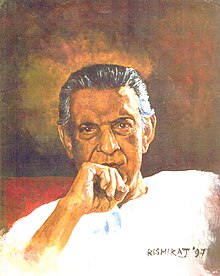
Satyajit Ray (listen; 2 May 1921 – 23 April 1992) was an Indian filmmaker who worked prominently in Bengali cinema and who has often been regarded as one of the greatest directors of world cinema. Ray was born in Calcutta (now Kolkata) to a Bengali family and started his career as a junior visualiser. His meeting with French film director Jean Renoir, who had come to Calcutta in 1949 to shoot his film The River (1951), and his 1950 visit to London, where he saw Vittorio De Sica's Ladri di biciclette (Bicycle Thieves) (1948), inspired Ray to become a film-maker. Ray made his directorial debut in 1955 with Pather Panchali and directed 36 films, comprising 29 feature films, five documentaries, and two short films.
Although Ray's work generally received critical acclaim, his film Pather Panchali and Ashani Sanket (1973) were criticised for "exporting poverty" and "distorting India's image abroad". His Apu Trilogy (1955–1959) appeared in Time's All-Time 100 Movies in 2005. Aside from directing, Ray composed music and wrote screenplays for films, both his own and those by other directors. Often credited as a fiction writer, illustrator, and calligrapher; Ray authored several short stories and novels in Bengali, most of which were aimed at children and adolescents. Some of his short stories have been adapted into films by other directors, including his only son, Sandip Ray. Considered a cultural icon in India and acknowledged for his contribution to Indian cinema, Ray has influenced several filmmakers around the world, including Wes Anderson, Martin Scorsese, James Ivory, François Truffaut, Carlos Saura, and Christopher Nolan. (Full article...)

Anne Hathaway is an American actress. She made her acting debut in the short-lived television drama series Get Real (1999–2000) before starring in her breakthrough role of Mia Thermopolis in the successful Disney comedy The Princess Diaries (2001). It established her as a teen idol and she later reprised the role in its sequel, Royal Engagement. The following year, Hathaway made her New York stage debut in the Encores! production of Carnival!. This was followed by a string of family films such as Nicholas Nickleby (2002) and Ella Enchanted (2004), which were box office flops. In 2005, she transitioned to more mature roles with the acclaimed romance Brokeback Mountain. In 2006, Hathaway starred opposite Meryl Streep in the highly successful comedy-drama The Devil Wears Prada and portrayed Jane Austen in the biographical drama Becoming Jane the following year.
Hathaway received critical acclaim and a nomination for the Academy Award for Best Actress for playing a recovering alcoholic in Rachel Getting Married (2008). She played Viola in The Public Theater's 2009 production of Twelfth Night, which garnered her a Drama Desk Award for Outstanding Actress in a Play. In 2010, she won a Primetime Emmy Award for Outstanding Voice-Over Performance for providing her voice for an episode on The Simpsons. The same year, she played the White Queen in Tim Burton's $1 billion grossing fantasy adventure Alice in Wonderland. For her role as a free-spirited artist in Love & Other Drugs (2010), she earned a Golden Globe Award nomination for Best Actress – Motion Picture Comedy or Musical. During this period, Hathaway also starred in a number of other box-office hits such as Get Smart (2008), Bride Wars (2009) and Valentine's Day (2010). She then went on to voice a Spix's macaw named Jewel in the animated comedy adventure film Rio (2011) and its sequel Rio 2 (2014). (Full article...)
The Lord of the Rings is a film series of three epic fantasy adventure films directed by Peter Jackson. The films, subtitled The Fellowship of the Ring, The Two Towers, and The Return of the King, were released serially worldwide between December 2001 and December 2003. They are based on J. R. R. Tolkien's epic fantasy novel, The Lord of the Rings, adapted for the screen by Jackson, Fran Walsh, and Philippa Boyens. Set in Tolkien's fictional Middle-earth, the plot follows the hobbit Frodo Baggins and his fellow members of the Fellowship of the Ring as they embark on a quest to destroy the One Ring, which will rid Middle-earth of the Dark Lord Sauron. A large ensemble cast was featured in the series, which included Elijah Wood, Ian McKellen, Viggo Mortensen, Sean Astin, Orlando Bloom, Liv Tyler, John Rhys-Davies, Sean Bean, Billy Boyd, Dominic Monaghan, Andy Serkis, Cate Blanchett, Christopher Lee, Hugo Weaving, Ian Holm, John Noble, Bernard Hill, David Wenham, Miranda Otto, Karl Urban, Craig Parker, Marton Csokas, and Brad Dourif.
All three films premiered to widespread critical acclaim. The Toronto Film Critics Association awarded Jackson a "Special Citation" for his work on the series as a whole, while the Austin Film Critics Association selected the entire series as the decade's third best film. The films won seventeen out of thirty Academy Award nominations, and The Return of the King holds the record for most Oscars with eleven alongside Titanic and Ben-Hur. The Return of the King also has the distinction of being the only fantasy film until The Shape of Water (2017) to have won the Academy Award for Best Picture. (Full article...)
The Academy Award for Best Actress is an award presented annually by the Academy of Motion Picture Arts and Sciences (AMPAS). It has been awarded since the 1st Academy Awards to an actress who has delivered an outstanding performance in a leading role in a film released that year. The award is traditionally presented by the previous year's Best Actor winner.
The Best Actress award has been presented 96 times, to 79 actresses. The first winner was Janet Gaynor for her roles in 7th Heaven, Street Angel, and Sunrise: A Song of Two Humans. The most recent winner is Emma Stone for her role in Poor Things (2023); she had previously won the award for her role in La La Land (2016). The record for most wins is four, held by Katharine Hepburn. Frances McDormand has won three times, and thirteen other actresses have won the award twice. Meryl Streep has received the most nominations in the category—seventeen—and has won twice. At the 41st Academy Awards, Barbra Streisand and Katharine Hepburn received the same number of votes and thus tied for Best Actress (the only time this has occurred). (Full article...)
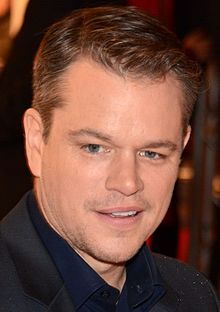
American actor Matt Damon made his film debut with a small role in Mystic Pizza (1988), after which he played several supporting roles. His first leading role was in the legal drama film The Rainmaker (1997). His breakthrough came later that year when he played the title role of an unrecognized genius in Good Will Hunting, which he also co-wrote with Ben Affleck. They won the Academy Award for Best Original Screenplay and Damon was nominated for Best Actor. He followed it by playing the title roles of a soldier in Steven Spielberg's war drama Saving Private Ryan (1998) and of the criminal Tom Ripley in the thriller The Talented Mr. Ripley (1999), both of which gained critical and commercial success. Damon and Sean Bailey worked on the television series Project Greenlight since 2000, helping newcomers make their first film.
Damon's profile continued to expand in the 2000s, as he took on starring roles in two lucrative film franchises. He played a con man in Steven Soderbergh's Ocean's Trilogy (2001–2007) and played the titular spy Jason Bourne in four films of the Bourne series (2002–2016). Damon played an energy analyst in the thriller film Syriana (2005) and starred in Martin Scorsese's acclaimed crime film The Departed (2006). He played the rugby player Francois Pienaar in the sports film Invictus (2009), gaining a nomination for the Academy Award for Best Supporting Actor. Damon continued to gain praise for his collaborations with Soderbergh on the crime film The Informant! (2009) and the drama Behind the Candelabra (2013). His portrayal of Scott Thorson in the latter earned him a Primetime Emmy Award nomination. (Full article...)
The film premiered in New York City on December 17, 2013. Paramount Pictures gave it a wide release in North America and France on December 25. The film grossed a worldwide total of over $392 million on a production budget of $100 million. As of August 2015, it is Scorsese's highest-grossing film. Rotten Tomatoes, a review aggregator, surveyed 276 reviews and judged 79% to be positive.
The Wolf of Wall Street garnered awards and nominations in a variety of categories with particular praise for Scorsese's direction, DiCaprio's performance as Belfort, and Winter's adapted screenplay. At the 86th Academy Awards, the film was nominated for five Academy Awards: Best Picture, Best Director for Scorsese, Best Adapted Screenplay for Winter, Best Actor for DiCaprio, and Best Supporting Actor for Hill but failed to win in any category. The Wolf of Wall Street earned four nominations at the 67th British Academy Film Awards (BAFTAs), including Best Director, Best Actor, and Best Adapted Screenplay but did not win in any category. The film received two nominations at the 71st Golden Globe Awards, including Best Motion Picture – Musical or Comedy with DiCaprio winning the Golden Globe Award for Best Actor – Motion Picture Musical or Comedy. The film was also nominated at the 66th Directors Guild of America Awards, the 25th Producers Guild of America Awards, and the 66th Writers Guild of America Awards. Both the National Board of Review and the American Film Institute included The Wolf of Wall Street in their respective lists of top ten films of 2013. (Full article...)
News
- September 2: Tributes paid to recently deceased US actor Chadwick Boseman
- October 7: Mockumentary Mister America has world premiere
- May 16: Actor Doris Day dies at 97
- January 22: Former U.S. intelligence agent Tony Mendez, architect of 'Argo' rescue, dies at 78
- Upcoming events
WikiProjects
Selected quote
Main topics
| Filmmaking |
|---|
 |
| Glossary |
- Terms - Animation • Beta movement • Camera • Cult film • Digital cinema • Documentary film • Dubbing • Experimental film • Fan film • Film crew • Film criticism • Film festival • Film frame • Film genre • Film journals and magazines • Film industry • Film manifesto • Film stock • Film theory • Filmmaking • History of film • Independent film • Lost film • Movie star • Narrative film • Open content film • Persistence of vision • Photographic film • Propaganda • Recording medium • Special effect • Subtitles • Sound stage • Web film • World cinema
- Lists - List of basic film topics • List of film topics • List of films • List of film festivals • List of film formats • List of film series • List of film techniques • List of highest-grossing films • List of longest films by running time • List of songs based on a film or book • Lists of film source material • List of open content films
Featured content
Subcategories
Subportals
Related portals
Things you can do
- Add
{{portal|Film}}to the See also section of film-related articles. - Tag the talk pages of film related articles with the {{WikiProject Film}} banner.
- Explore the list of English language films without an article
- Check tasks and announcements at WPFILM Announcements.
- Collaborate with other participants at Wikipedia:WikiProject Film.
- Join one of the task forces at Wikipedia:WikiProject Film/Sidebar.
Associated Wikimedia
The following Wikimedia Foundation sister projects provide more on this subject:
-
Commons
Free media repository -
Wikibooks
Free textbooks and manuals -
Wikidata
Free knowledge base -
Wikinews
Free-content news -
Wikiquote
Collection of quotations -
Wikisource
Free-content library -
Wikiversity
Free learning tools -
Wiktionary
Dictionary and thesaurus










![Image 10Louis Poyet [fr]'s engraving of the mechanism of the "fusil photographique" as published in La Nature (april 1882) (from History of film technology)](http://upload.wikimedia.org/wikipedia/commons/thumb/f/f0/Fusil_photographique_Marey2.png/120px-Fusil_photographique_Marey2.png)







































